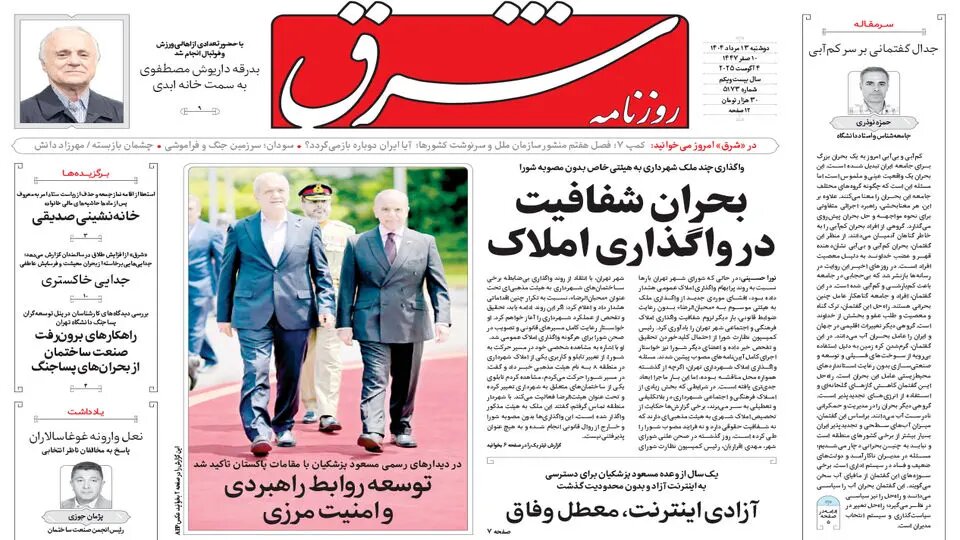Possible consequences of snapback mechanism activation

TEHRAN - In an analysis, Shargh discussed the consequences of the possible activation of the snapback mechanism by the European trio of Britain, France and Germany.
It said: If the mechanism is activated, the extensive UN sanctions against Iran will be reimposed, which could have severe economic and political effects on the country. This measure is likely to escalate tensions in the West Asia region and severely affect the process of negotiations and diplomatic interactions. In the current situation, the positions of both sides have grown increasingly polarized and stricter than before, and the possibility of a quick agreement has decreased. European countries have adopted a policy of pressure, focusing on restoring sanctions, while Iran considers an activation of the snapback mechanism a threat to its sovereignty and national interests and is ready to respond decisively. Ultimately, the activation of the snapback mechanism could be challenging for Iran in the short term, but in the medium term, it also carries the risk of further isolating Europe in regional and global equations. Therefore, a sustainable solution can only come through constructive dialogue and respect for the rights of both parties.
Hamshahri: Importance of Pezeshkian trip to Pakistan
Hamshahri examined the importance of President Pezeshkian's trip to Pakistan and said: Pezeshkian's trip took place in a situation that analysts believe the two important regional players are taking special steps towards fostering closer cooperation in political, economic and security fields, and that common goals have pushed Tehran and Islamabad to deepen "strategic cooperation". This trip is of particular importance given the sensitive regional condition, developments in Gaza, the key role of the two countries in regional stability, and increase in economic and trade relations. It is clear that security, especially along the 900-kilometer common border, featured high in the trip. The two countries intend to counter common threats such as smuggling, terrorism, and border insecurity. Also, after the 12-day war imposed by the Zionist regime against Iran, Islamabad played a kind of mediating role; an issue that seems was discussed during the trip.
Sobh-e-No: New regional position and role of Iran's active diplomacy
Sobh-e-No wrote about the expansion of Iran's relations with neighboring Pakistan following President Pezeshkian’s visit to the country. It said: In the light of accelerating global and regional developments, this trip has taken on a deeper meaning than an official visit and carries strategic messages for neighbors, international actors, and public opinion in the Muslim nations of Iran and Pakistan. The geopolitical order of South Asia and Central Asia has witnessed significant changes in recent months. Moreover, the growing influence of China and India in areas of energy and trade, and the aggressive role of the Zionist regime in West Asia, have fundamentally changed the security environment in the region. In such circumstances, Iran, relying on its domestic power components, is seeking to redefine its position as a connecting link between East and West Asia. In this context, the expansion of relations with Pakistan not only has bilateral dimensions but is also considered a key element in realizing the grand strategy of connecting a territory from the Sea of Oman to Central Asia and Europe. This connection, via Sistan-Baluchestan and the China-Pakistan Economic Corridor (CPEC), could be one of the alternative economic routes to evade Western sanctions and pressures.
Jam-e-Jam: A big step in defense
In a recent article, Jam-e-Jam examined Iran’s evolving defense doctrine following the establishment of the Defense Council. The article stated: After the 12-day war with Israel and the emergence of indicators pointing to a new phase of regional confrontations, the Islamic Republic of Iran has taken a significant step to reassess its defense strategy. This decision is rooted not only in the constitutional framework but also reflects the complex and shifting security dynamics of the region and the world. This move is expected to enhance Iran’s agility and improve decision-making in defense-related matters. The new structure is built around three core objectives:
- Strengthening the country’s defense capabilities in a comprehensive and coordinated manner
- Accelerating response times to crises and threats
- Ensuring the consistent and effective involvement of operational commanders in national decision-making
The formation of the Defense Council signals Iran’s readiness for a new phase of strategic developments—one that extends beyond conventional territorial defense to encompass the protection of strategic assets, the geography of resistance, and long-term national interests. In an era defined by ‘security as active deterrence,’ the imperative for swift, coordinated, and coherent decision-making has become a strategic necessity.”
